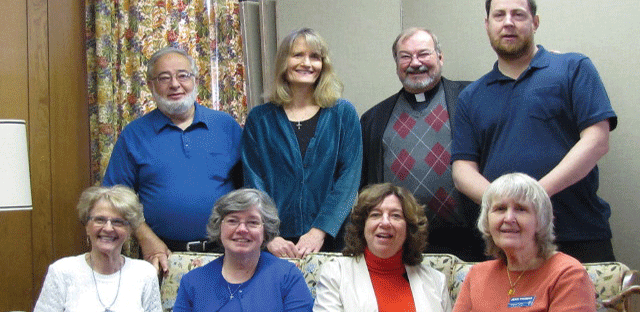A specialized one-to-one caring program has brought new ministry opportunities in two Reformed Church congregations in New Jersey.
The national, faith-based Stephen Ministries (www.stephenministries.org) trains key church leaders who then train fellow church members to provide a listening ear and a comforting presence to people who are hurting.
“It’s been a remarkable ministry,” says Hillsborough Reformed Church pastor Fred Mueller. “Between our trained Stephen leaders, Stephen ministers, and those receiving care, we’ve involved a quarter of our congregation,” he says of the church where 120 people gather for weekly worship.
A specialized one-to-one caring program has brought new ministry opportunities in two Reformed Church congregations in New Jersey.
The national, faith-based Stephen Ministries (www.stephenministries.org) trains key church leaders who then train fellow church members to provide a listening ear and a comforting presence to people who are hurting.
“It’s been a remarkable ministry,” says Hillsborough Reformed Church pastor Fred Mueller. “Between our trained Stephen leaders, Stephen ministers, and those receiving care, we’ve involved a quarter of our congregation,” he says of the church where 120 people gather for weekly worship.
The program’s name comes from Stephen, the first chosen “helper” (deacon) in the biblical book of Acts.
Several Hillsborough members attended a weeklong training in 2006 that qualified them as Stephen leaders. From there they offered coursework at Hillsborough to Stephen minister candidates, qualifying them to assist “care receivers,” or people who are hurting. The training takes a spiritual approach in developing relational, listening, and caring skills for hurting people.
There are rather strict rules. Referrals and the pairings of Stephen ministers and care receivers are confidential, with names known only to a single church designee. Men are assigned to men and women to women.
“This is not counseling—we don’t deal with things like mental illness, addiction, or abuse,” Mueller says. “We like to say, ‘God is the cure-giver, we are the care-givers.’”
Ocean Community Church in Manahawkin, New Jersey, sent elder Glenn Ferguson to Stephen training in 2012. He led the first Stephen class in the church that fall.
In the middle of that first training, Hurricane Sandy ravaged the Atlantic shore, including Ocean County, home to Ocean Community Church.
“That was interesting because we were conditioning people to be in a ‘caring’ mode,” Ferguson says. The congregation has now hosted 400 volunteers to help the area recover. They began a second Stephen class the following year.
“Now we have 10 Stephen ministers and two leaders,” he says.
Stephen ministers complete a 50-hour course and commit to be an active minister for two years. They are assigned just one care receiver at a time, with personal visits or phone conversations that take place weekly for anywhere from a month up to a year. There’s also a continuing education component and peer review sessions that protect the confidentiality of those receiving care.
So far all of Ocean Community’s requests for Stephen ministers have come from within the church—often through a family member or friend of the person needing care. Typical care receivers are negotiating life’s difficult passages: loss of spouse or job, health concerns, discouragement, or loneliness. A military base in the region has led care givers also to address veterans’ issues.
In addition, Ocean’s Stephen ministers have received training in visiting long-term nursing home residents and hospice patients.
“We also visit shut-ins who can’t or don’t want to go to church but still want to have a Christian relationship,” Ferguson says.
He says Stephen Ministries is about doing exactly what believers are supposed to be doing—living the life of Christ and bringing his love to people. “How can we say no to that?”





